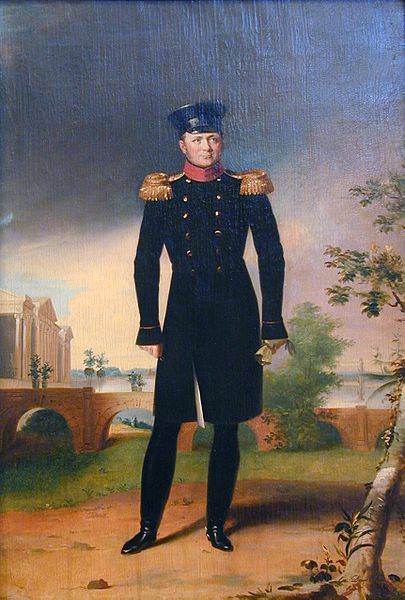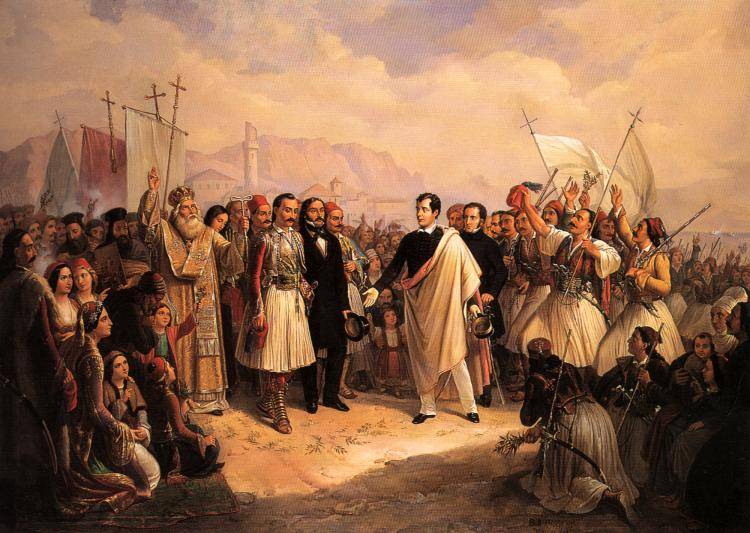How Alexander I Missed the Opportunity to Use Greece to Divide the Ottoman Empire

Alexander Pavlovich in front of the Cameron Gallery. George Doe
Greek question
The Peace of Bucharest in 1812 was not final (How Kutuzov saved Russia from a war on two fronts). A new military clash between Russia and Turkey was inevitable. Too many questions and contradictions remained unresolved. The Ottoman Empire decayed, collapsed, questions arose about who would be its heir. The Turks controlled many strategic regions, points, communications that other powers wanted to get. It was also beneficial for the Western powers to set the Ottomans against the Russians.
The next point of contention was the Greek question. In 1820–1821 an uprising began in Greece. Turkey responded with mass terror against the civilian population. So, in Candia on Crete, the Janissaries killed the metropolitan and five bishops right in the altar of the cathedral. Sultan Mahmud personally ordered the hanging of the Patriarch of Constantinople Gregory (he was suspected of having links with the rebels) on the gates of his own palace. Three metropolitans were also executed. Because the Greek corsairs seized a Turkish ship off the island of Chios, the Ottomans killed or sold into slavery the entire Christian population of the island (about 100 thousand people). These were only episodes of the bloody massacre. In fairness, we must remember that the Greek rebels did not stand on ceremony with the Ottomans either.
The Greek Revolution affected the economic and strategic interests of the Russian Empire. After the war of 1812, the rapid economic growth of southern Russia began. In 1817, Odessa became a free port, like the current free economic zone. The city is turning into a major international trade center. 500-600 merchant ships arrived at the port annually. A significant part of the merchant ships that visited Odessa, Taganrog, Mariupol and other Russian ports belonged to the Greeks. Most of the Greeks were subjects of Turkey, some - of Russia. Now trade has been disrupted. Turkish privateers seized and robbed merchant ships, without understanding what citizenship their owners had.
Due to the war in Greece and the shortage of bread in the capital, Sultan Mahmud imposed an embargo on the transport of grain and a number of other goods through the straits. Bread and other goods were confiscated from violators and sold in Istanbul at fixed prices. The Russian envoy in Constantinople, Stroganov, repeatedly protested to the Porte about the violation of the rights of Russian subjects and Russia's trade interests. In July 1821, the Russian embassy left the Turkish capital in protest.

Arrival of Lord Byron in Greece. Painting by T. Vryzakis, 1861
Alexander I misses a great chance
The war with Turkey met the military-strategic, national interests of Russia (Russia's Lost Chance: Catherine the Great's Tsargrad Operation). The occasion was excellent. It was possible to use the favorable situation when Turkey was tied up in the fight against the Greek rebels. And the Russian army was the strongest in Europe - Russia was then called the "gendarme of Europe." France, after the “bloodletting” in the wars of Napoleon, could not oppose Russia. England did not have serious opportunities on land and preferred to pit peoples and countries against each other. Prussia and Austria were formally our allies in the Holy Alliance. Obviously, Vienna and Berlin did not like the strengthening of Russia at the expense of the Porte. However, the Prussians and Austrians could not do anything serious.
Thus, Russia could decide in its favor the situation on the Danube, in the Balkans as a whole, in the strait zone and in the Caucasus. In Russia, an educated society (nobles, merchants, clergy and intelligentsia) supported the struggle of the Greek patriots.
However, the Russian Emperor Alexander I once again ignored national interests. He adhered to the principle of legitimism - legitimate dynasties had to retain their territories. That is, from the point of view of the national, strategic interests of Russia, it was beneficial for us to destroy the Ottoman Empire, to divide it, in which we received the Bosphorus and the Dardanelles, control over the Christian and Slavic peoples of the Balkans, restored under our leadership historical Georgia and Armenia. And legitimism was beneficial to our Western "partners" - Austria, England and France, who did not have our capabilities in these regions, but wanted to stop the movement of the Russian Empire to the south and southwest.
The Holy Alliance - a conservative union of Russia, Prussia and Austria, created to maintain the international order established at the Congress of Vienna (1815), only interfered with Russia, restrained it. As a result, Tsar Alexander Pavlovich, at the suggestion of the cunning Austrian Chancellor Metternich, who had put in a lot of work to weaken Russia, refused to support Greece.
As a contemporary, Prince Pyotr Dolgorukov, wrote:
So Petersburg missed the opportunity to achieve the independence of Greece and get a pro-Russian Greek state on the Balkan Peninsula. With our military bases. Russians and Greeks together could revive Tsargrad-Constantinople. At this time, many Greeks were drawn to Russia, they saw in it the Third Rome - the defender of Orthodoxy, Christians from the Omani oppressors. The Greeks became Russian subjects, studied the Russian language and culture. That is, there was a serious potential for the Russian-Greek union.
It ended with the fact that Greece eventually gained independence, but at the suggestion of the Western powers. Then Greece began to drift towards the West, preserving the traditional sympathies of the common people for the Russians, Russia.
As a result, Greece is now a member of the NATO bloc, supporting and arming the Ukrainian Nazi regime against the Russian world. This is how “Byzantineism” and “cunning plans” harm the Russian state and the Russian people.
Information